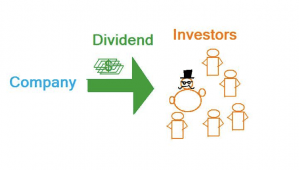What Is Dividend?

A dividend is a sum of money paid regularly (typically quarterly) by a company to its shareholders out of its profits. Sounds complicated? Read on!
An example of how dividend works
Say you want to start a pizza business. You need some capital, and you realise your life savings isn’t quite enough. So, you go about raising some money from investors, and in return for investing in your pizza business, you issue some shares to these investors.

Your first pizza shop is a huge success and makes a lot of money. You reinvest the profits and open more shops. This continues for a number of years, and eventually, your business is at a point where your biggest competitors are your own pizza shops (this is also known as market saturation).

At this point, you are sure you can continue to make a lot of money from pizza sales. So, you start paying back part of the profits to investors. This “profit payout” back to investors is essentially what a dividend is.

Dividends can vary depending on how well a business performs. A company generally starts to pay out dividends to its shareholders when the company’s growth start to slow. Dividend rates can vary depending on which industry the company is in. For example, telecommunications / utilities companies and real estate investment trusts (REITs) typically pay out higher dividends, while internet / e-commerce and biotech companies pay less (sometimes none!).
Now – you may ask, is investing in shares a form of gambling? Read our beginner’s guide to investing in shares to find out!










